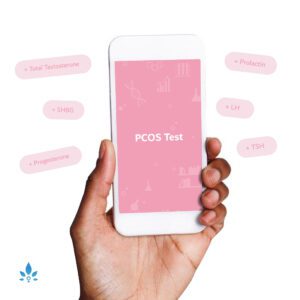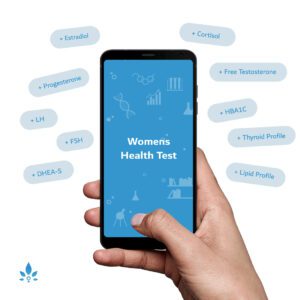What are Some of the Symptoms Associated with PCOS?


Polycystic Ovary Syndrome (PCOS) is most frequently classified according to the predominant clinical symptoms that a patient presents with. The three major ones are anovulation, hyperandrogenism and polycystic ovaries; and most medical guidelines stipulate that two out of three of these are required prior to a diagnosis being made. You can read more about how the condition is classified by symptoms by clicking here.
Of course discerning the type of PCOS that you have is very important. Only by understanding this will you be able to instigate a treatment plan. However, to really treat the condition and to achieve optimal relief from the symptoms you have, it is perhaps worth breaking it down further and looking at the factors that are very closely associated with PCOS. There is substantial evidence that by managing these factors and alleviating the associated symptoms, you will significantly reduce the impact PCOS has on your day-to-day life.
Insulin resistance
An increased sensitivity to insulin is very common in women who have classic PCOS. Classic PCOS is characterised by chronic anovulation and hyperandrogenism with or without polycystic ovaries. Women with classic PCOS are more likely to experience concurrent metabolic symptoms, the most common of which is insulin resistance.
Up to 85% of patients with PCOS have hyperinsulinemia. These patients are often borderline diabetic and are frequently overweight.
Increased insulin potentiates ovarian androgen production, which is a driving factor of hyperandrogenism. Insulin modulates ovarian steroidogenesis, which is the process by which the steroid hormones oestradiol and progesterone are synthesised from cholesterol. It is also involved in the control of ovulation, via an insulin signalling pathway in the central nervous system.
Treating insulin resistance
Insulin resistance is often treated with insulin sensitising drugs, such as metformin. Whilst this type of medication does not completely normalise circulating androgen levels, it can significantly reduce testosterone levels and has been used to successfully restore ovulatory menstrual cycles in some women with classic PCOS.
Another frequently prescribed medication for the treatment of PCOS is the oral contraceptive pill. This treatment is not suitable for those who are insulin resistant, as many forms of the pill impair insulin sensitivity. This means that, worryingly, the most widely used treatment for PCOS is probably unsuitable for the majority of women who exhibit the symptoms of the classic form of the condition. This should be discussed with your doctor prior to commencing treatment.
Fortunately, there is an alternative, which avoids prolonged use of medication (that may be doing more harm than good anyway). Lifestyle modifications in the form of diet adjustments, weight loss and reduced sugar intake, can help to rectify the symptoms of PCOS that are associated with insulin resistance. Studies have shown that as little as 5% weight loss can regulate the menstrual cycle and improve fertility. In fact, holistic lifestyle changes are now considered to be the most sustainable treatment approach for many patients with PCOS.
Alongside this, dietary supplements can be used to provide complementary relief from the symptoms of classic PCOS. Oral magnesium supplements have been shown to improve insulin sensitivity, and small-scale studies have demonstrated that co-supplementation of omega-3 fatty acids with vitamin E improved insulin resistance and reduced the levels of circulating testosterone. Further work is required to substantiate the claim that omega-3 fatty acids may be a viable treatment option for PCOS.
Women who have PCOS and are insulin resistant need to find a way of managing their condition, not just for short term symptomatic relief, but also because they are predisposed to developing other conditions including metabolic syndrome, non-alcoholic fatty liver disease, gestational diabetes and pregnancy-induced hypertension.
Finally, women with non-classic PCOS who have normal ovulation and/or normal androgen levels, will usually only experience mild metabolic symptoms. They are less likely to be overweight and will often have normal insulin sensitivity. However, there is the possibility that extrinsic risk factors, such as weight gain, may cause their condition to convert to classic PCOS over time. Thus, a good diet and maintenance of a healthy weight is recommended for all women with PCOS.
Obesity and Inflammation
Obesity is a common side effect of classic PCOS; between 50 and 80% of women with PCOS are obese (Body Mass Index (BMI) > 25). Women who are obese also seem to have more severe signs of hyperandrogenism. Obesity is intrinsically linked to insulin resistance, and furthermore, being overweight serves as a maker of chronic low-grade inflammation.
Inflammation is inherently linked to almost all diseases. Exposure to any stressor or inflammatory agent, whether it is endogenous, or an external trigger in the diet or environment, causes the immune system to react and produce certain markers. Measuring the levels of these markers can help to determine the inflammatory status of a particular individual.
Whilst it is widely accepted that PCOS is a condition of chronic low-grade inflammation, controversy remains as to whether the condition itself is inflammatory, or whether the circulating markers that are found in the blood serum are a secondary effect of the associated conditions, such as insulin resistance and obesity.
One meta-analysis (a review encompassing a large number of studies) found a two-fold elevation in one of the most common inflammation markers, C-reactive protein, in women with classic PCOS. This increase was independent of obesity status. Other studies have found increases in the levels of interleukin-18 and higher white blood cell counts, which are both markers of inflammation.
However, critics of the theory argue that the fold changes are not large, often the study sizes are small, and the results are inconsistent. It should also be noted that reproductive processes including ovulation and menstruation, cause a transient increase in markers of inflammation, but, under normal conditions, these inflammatory reactions are rapidly resolved and normal reproductive function is maintained.
There is some evidence that inflammation can impede ovulation directly and that it stimulates the ovaries to produce excess androgens. This would indicate that chronic inflammation is the driving factor behind cases of classic PCOS; inducing the two main symptoms of the condition, anovulation and hyperandrogenism. However, others believe that the inflammation observed in women with PCOS is a secondary event.
Regardless of the exact mechanism involved and whether the inflammatory response in PCOS is cause or effect, what is clear is that the normal endocrine-immune state is disrupted and treatment should focus on restoring it to normal.
Treating obesity
The first step for most women with classic PCOS should be to focus on reducing their BMI. Losing weight reduces inflammation. It is also associated with a reduction in circulating androgens, enhanced ovulation induction and improvements in metabolic function. Highlighting the importance of weight loss for overcoming the symptoms of classic PCOS.
Taking a holistic approach to therapy and minimising exposure to irritants in the environment and diet also helps to alleviate some of the associated inflammation seen in many cases of PCOS.
- A healthy diet with no processed foods and limited alcohol intake will minimise the likelihood of an immune response.
- Dietary supplements can also help to reduce the effects of inflammation. Magnesium, in addition to reducing insulin levels, has anti-inflammatory activity and, therefore, is one of the most useful supplements to take. When given as a co-supplement with vitamin E, magnesium reduced the levels of inflammatory biomarkers, including C-reactive protein, and lessened the signs of hirsutism.
These approaches are particularly effective for patients who show other signs of immune dysfunction, such as headaches, frequent infections and skin complaints.
As with insulin resistance, there is a pressing need to manage inflammation because it too can have long term health implications. If left untreated, it can predispose an individual to life-threatening conditions, such as cardiovascular disease (CVD). In fact, the inflammation marker that has been shown to be increased in women with PCOS, C-reactive protein, is regularly used as a biomarker for assessing the risk of CVD.
Urinary and Bowel Issues
Despite its name, polycystic ovary syndrome does not require the presence of polycystic ovaries. In fact, when present together, hyperandrogenism and anovulation comprise the classic form of PCOS, which is more common and generally associated with more severe side effects than the non-classic form.
Women who have non-classic PCOS have polycystic ovaries with regular menstrual cycles and hyperandrogenism (non-classic ovulatory PCOS) or normal androgens and chronic anovulation (non-classic mild/normoandrogenic PCOS).
Although non-classic PCOS is typically milder, those women who have extensive ovarian cysts may experience pain in the pelvic region where the cysts press against the bladder and rectum. Associated symptoms include nausea, urinary conditions and constipation. Depending on the severity of the symptoms, treatment options range from over-the-counter pain relief medication, to cyst removal under general anaesthetic. Ultrasound investigation will be used to establish how invasive the cysts are.
Conclusion
It is only when you start to explore the symptoms of PCOS in detail that the complexity of the condition becomes apparent. Clearly many of the associated factors are interlinked, for example, obesity connects both insulin resistance and inflammation. Many patients with PCOS experience symptoms that are often associated with diabetes, such as sugar cravings, frequent urination, blurred vision, delayed healing and a tingling sensation. They are also more susceptible to mood swings, anxiety and depressive episodes. However, with so many associated symptoms, the aetiology of these psychological issues is likely to be multifarious and complicated.
Women who are experiencing PCOS-like symptoms also need to establish whether they are due to an underlying medical issue or a sign of pill-withdrawal rather than PCOS itself. There are a number of conditions that can give rise to abnormal uterine bleeding, or anovulation, and these should be discounted before a PCOS diagnosis is made.
Currently, one of the major unanswered questions with regards to PCOS symptoms and the associated factors is which came first? Does having PCOS predispose a female to becoming prediabetic, or does insulin resistance or obesity cause the symptoms characteristic of classic PCOS (anovulation and hyperandrogenism)? There is certainly a correlation between the two and treating the insulin resistance and losing weight seems to alleviate PCOS symptoms.
Try Nabta’s PCOS Test and get to learn more.
To date, the best approach we have for reversing PCOS is to uncover the associated conditions and, regardless of whether they are causative or consequential, attempt to rectify them. In doing this, it is hoped that the majority of patients will experience substantial symptomatic relief.
Nabta is reshaping women’s healthcare. We support women with their personal health journeys, from everyday wellbeing to the uniquely female experiences of fertility, pregnancy, and menopause.
Get in touch if you have any questions about this article or any aspect of women’s health. We’re here for you.
Sources:
- Diamanti-Kandarakis , E, and A Dunaif. “Insulin Resistance and the Polycystic Ovary Syndrome Revisited: An Update on Mechanisms and Implications.” Endocrine Reviews, vol. 33, no. 6, 1 Dec. 2012, pp. 981–1030., doi:10.1210/er.2011-1034.
- Duleba, A J, and A Dokras. “Is PCOS an Inflammatory Process?” Fertility and Sterility, vol. 97, no. 1, Jan. 2012, pp. 7–12., doi:10.1016/j.fertnstert.2011.11.023.
- Ebrahimi, F A, et al. “The Effects of Omega-3 Fatty Acids and Vitamin E Co-Supplementation on Indices of Insulin Resistance and Hormonal Parameters in Patients with Polycystic Ovary Syndrome: A Randomized, Double-Blind, Placebo-Controlled Trial.” Experimental and Clinical Endocrinology & Diabetes , vol. 125, no. 6, June 2017, pp. 353–359., doi:10.1055/s-0042-117773.
- El Hayak, S, et al. “Poly Cystic Ovarian Syndrome: An Updated Overview.” Frontiers in Physiology, vol. 7, 5 Apr. 2016, p. 124., doi:10.3389/fphys.2016.00124.
- Escobar-Morreale, H F, et al. “Circulating Inflammatory Markers in Polycystic Ovary Syndrome: a Systematic Review and Metaanalysis.” Fertility and Sterility, vol. 95, no. 3, 1 Mar. 2011, pp. 1048–1058., doi:10.1016/j.fertnstert.2010.11.036.
- González, F. “Inflammation in Polycystic Ovary Syndrome: Underpinning of Insulin Resistance and Ovarian Dysfunction.” Steroids, vol. 77, no. 4, 10 Mar. 2012, pp. 300–305., doi:10.1016/j.steroids.2011.12.003.
- Jabbour, H N, et al. “Inflammatory Pathways in Female Reproductive Health and Disease.” Reproduction, vol. 138, no. 6, Dec. 2009, pp. 903–919., doi:10.1530/REP-09-0247.
- Lorenz, T K, et al. “Links among Inflammation, Sexual Activity and Ovulation: Evolutionary Trade-Offs and Clinical Implications.” Evolution, Medicine and Public Health, vol. 2015, no. 1, 16 Dec. 2015, pp. 304–324., doi:10.1093/emph/eov029.
- Marshall, J C, and A Dunaif. “Should All Women with PCOS Be Treated for Insulin Resistance?” Fertility and Sterility, vol. 97, no. 1, Jan. 2012, pp. 18–22., doi:10.1016/j.fertnstert.2011.11.036.
- Norman, R J, et al. “The Role of Lifestyle Modification in Polycystic Ovary Syndrome.” Trends in Endocrinology and Metabolism, vol. 13, no. 6, Aug. 2002, pp. 251–257.
- Pasquali, R, et al. “The Impact of Obesity on Reproduction in Women with Polycystic Ovary Syndrome.” BJOG, vol. 113, no. 10, Oct. 2006, pp. 1148–1159., doi:10.1111/j.1471-0528.2006.00990.x.
- Patel, S. “Polycystic Ovary Syndrome (PCOS), an Inflammatory, Systemic, Lifestyle Endocrinopathy.” The Journal of Steroid Biochemistry and Molecular Biology, vol. 182, Sept. 2018, pp. 27–36., doi:10.1016/j.jsbmb.2018.04.008.
- Shokrpou, M, and Z Asemi. “The Effects of Magnesium and Vitamin E Co-Supplementation on Hormonal Status and Biomarkers of Inflammation and Oxidative Stress in Women with Polycystic Ovary Syndrome.” Biological Trace Element Research, 18 Dec. 2018, doi:doi: 10.1007/s12011-018-1602-9.













































